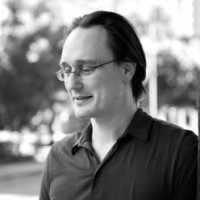by Matthew Remski, with Scott Petrie
Before speaking, before time, before individuation – we begin with the ground of embodied perception. Lips wrapped around the nipple, bodies molded to the mother’s side. One continuous flesh with the mother, with the world. The eyes do not sharpen upon objects, and sound is everywhere. We begin with sensations, oceanic, and carry these as implicit memory. We may become distracted from embodiment, but as sure as we read this, it has remained. The light and the marks and the hum of space pre-exist whatever sentences this text will structure.
We recapture this coherence through yogas of sensation and presence: asana and breath.
∞
As consciousness blossoms between 18 and 24 months, sounds become words, sights become objects, and feelings become a body: you are capable of explicit memory – the eye that captures the whole of you against the whole of everything else, taking the picture of the first thing you remember, a crystallization of self. Words become sentences, sentences become propositions. Descriptions, reasons and instructions are added to the ground of perception. The mother’s umbilical connection fades, and the father’s tether of words replaces it. On top of sensation, thought gathers like pixels to be organized into internal pictures that mirror or dispute what now seems outside.
∞
We begin with sensations, and continue with what we are told. The world is carved by the words of others. The software of language and culture is given and installed. Words become sentences. Sentences become strategies. Strategies become beliefs. The majority of early cognitions are taught. This teaching establishes knowledge as other, from another place, something received.
More than this: teaching is something that protects and explains and makes for survival. From the breast to the word, the given nurturance of mother and father are the root of maintenance, the assumption of safety, the ground of faith.
This is why we quite naturally believe in gods and heroes, or any ordering principle that is given to us whole, before we have the tools to take it apart, examine it, reverse engineer it, or redesign it for another purpose. Mother knows by holding. Father holds by knowing.
∞
Early consciousness, informed by teaching, is theological. After asana, so are our first steps in the study of yoga. It comes through a given language, fully formed. We go for yoga “teachings”, and recapture early memories of being held by simple words that told us we were safe, and that our parents had power and strength to transfer into us.
The Upanishads are exactly this: fathers giving sons perfect theological teachings. “Everything is Brahman.” “You are that very Self.” The son melts into the father’s knowing gaze, and feels eternally held. We remember this. Or we wish we remember this.
∞
The given teachings of yoga are theological. Sometimes they are literally “words (logoein) about god (theos)”. But even when they are not about god, as when Patanjali says that nature exists for the sake of consciousness (YS 2:21), the teaching conveys a theological structure, performing the same functions of simplification and security as anything that is given whole.
Theology confers safety. But time dries the mother’s milk. Time kills the father. Time shows the teacher to be a person, struggling, just like yourself. Time and experience smashes all words. Even words about god.
When you are broken, when you have lost safety, when you are dying to yourself, there is yet an “incredible need to believe” (Kristeva, 2009) that throws you hurtling towards the creation of new meanings. But new meanings require new language. A language that recreates what is given. The words that you once used, the given words, the words about god or reality or how things are, have been taken away. In the emptiness they leave, another seed of yoga swells with life. It is philosophy: “love (philos) of wisdom (sophia).”
Words about god throw us, as they break, into the love of wisdom.
The love of wisdom is not given. It is not testimony. It is not a teaching. It does not say “In the beginning, god created the heavens and the earth.” It rather says: “The first thing I remember was a feeling.” The love of wisdom does not say “Thus I have heard.” It rather asks “What can I know?” The love of wisdom is an activity you surrender to when you realize you have no choice but to become your own mother, your own father.
∞
Where do we start in yoga, as in life? We start with sensory perception, which is never lost, though easily covered over. We continue with theology, which grounds a given safety, but can distract us from perception. The need for this safety is never lost. This need pushes up a flower from the compost of rotting words: love. Love for what happens, love for confusion, love in pain: the love of not knowing. Love feels like a return to perceptual immersion. The mouth stops speaking, filled with the breast of wisdom. The body stops aching, molded to another body, a remembered flesh of coherence. The world enwombs, as it always did.
_____________
photo by scott petrie
Matthew Remski is an author, yoga and ayurvedic therapist and educator, and co-founder of Yoga Community Toronto. With Scott Petrie he is co-creator of yoga 2.0, a writing and community-building project.
yoga 2.0: shamanic echoes, is now available for kindle and other e-readers.










Read 7 comments and reply